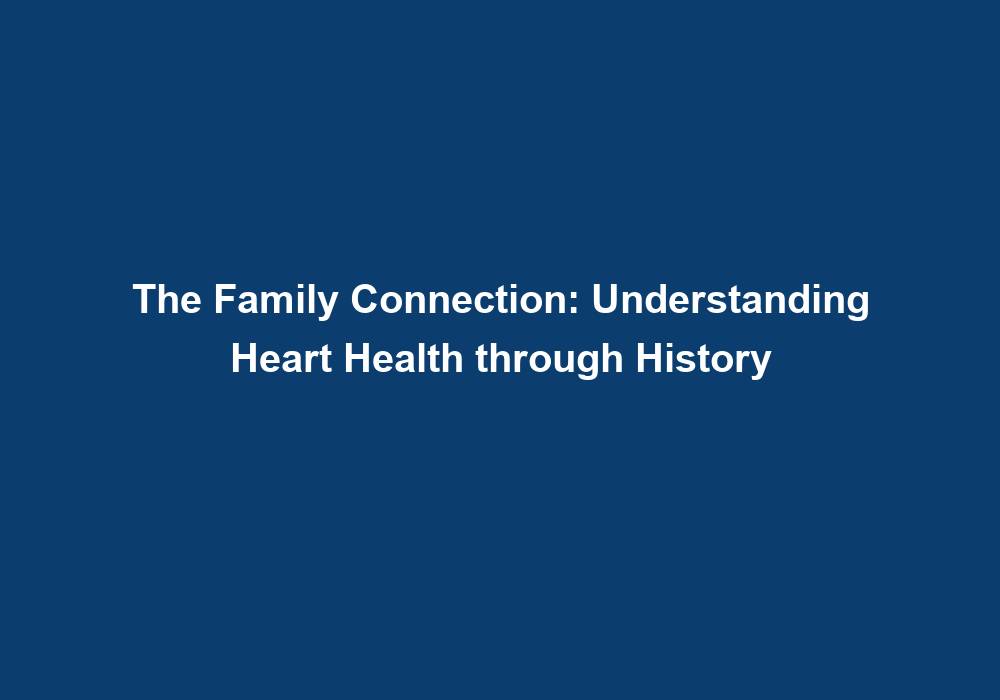The Family Connection: Understanding Heart Health through History
Heart health is a topic of vital importance that affects individuals of all ages and backgrounds. Research has shown that heart conditions can often be linked to family history, making it crucial to understand the role of genetics in heart health. By delving into the history of heart health within a family, individuals can gain valuable insights that may help identify potential risks and take preventive measures. In this article, we will explore the significance of understanding heart health through family connections and how it can contribute to overall well-being.
The Role of Genetics in Heart Health
Genetics play a significant role in the development of various health conditions, including heart diseases. The genes we inherit from our parents can influence our susceptibility to certain heart-related issues. Understanding the genetic factors involved can help individuals better comprehend their own risk levels and make informed decisions about their lifestyle and healthcare choices.
Genetic factors can determine how our bodies process cholesterol, how our blood vessels function, and how our heart muscles work. For example, if a person has inherited genes that increase their cholesterol levels, they may have a higher risk of developing atherosclerosis, which is the buildup of plaque in the arteries. Similarly, certain genetic variations can affect the electrical system of the heart, increasing the risk of arrhythmias or abnormal heart rhythms.
By understanding the role of genetics in heart health, individuals can take proactive steps to mitigate their risks. They can work closely with healthcare professionals to develop personalized prevention and treatment strategies that take into account their genetic predispositions. This knowledge empowers individuals to make informed choices about their lifestyle and healthcare, leading to better heart health outcomes.
Family History and Heart Disease
Family history is considered a crucial factor in assessing the risk of heart disease. If an individual has close relatives who have been affected by heart conditions, they might have a higher likelihood of developing similar issues. This is particularly true if the conditions occurred at a young age or affected multiple family members.
The presence of heart disease in a family can indicate a combination of genetic and environmental factors that contribute to the development of the condition. It is important to gather specific information about the type of heart condition, the age of onset, and the severity of the condition within the family. This information can help healthcare professionals identify potential patterns and assess an individual’s risk more accurately.
For example, if an individual’s parents or siblings have experienced a heart attack at a young age, it may indicate a strong genetic component to their risk of heart disease. On the other hand, if the heart disease in the family is primarily due to lifestyle factors, such as smoking or poor diet, it may indicate a need for lifestyle modifications rather than genetic testing.
Understanding the specifics of family history can also help individuals recognize early warning signs and symptoms of heart disease. For instance, if a family member experienced chest pain or shortness of breath before a heart attack, other family members can be vigilant for similar symptoms and seek medical attention promptly.
The Importance of Understanding Heart Health History
Understanding the family’s heart health history can bring several benefits, ranging from early detection to preventive measures. Here are some key reasons why comprehending this history is essential:
Early Detection and Diagnosis
By knowing the family’s heart health history, individuals can be more proactive in seeking regular check-ups and screenings. Recognizing the potential risks associated with certain heart conditions can prompt them to consult with healthcare professionals and undergo relevant tests at an earlier stage. Early detection significantly increases the chances of successful treatment and prevention of complications.
Regular screenings, such as blood pressure checks, cholesterol tests, and electrocardiograms, can help identify early signs of heart disease. By monitoring these indicators, individuals can work closely with healthcare professionals to identify potential risk factors and take appropriate preventive measures. For example, if a family member has been diagnosed with high blood pressure, other family members may be advised to monitor their blood pressure regularly and adopt lifestyle modifications to keep it under control.
Lifestyle Modifications
Knowledge about the family’s heart health history can also serve as a wake-up call for individuals to adopt healthier lifestyle habits. Making positive changes in diet, physical activity, and stress management can have a substantial impact on reducing the risk of heart diseases. It is essential to remember that while genetics play a role, lifestyle choices can often mitigate or offset these risks.
A family history of heart disease can provide valuable insights into the impact of lifestyle factors on heart health. For example, if multiple family members have developed heart disease due to smoking, it highlights the importance of quitting smoking and avoiding exposure to secondhand smoke. Similarly, if there is a history of obesity-related heart conditions, it emphasizes the need for maintaining a healthy weight through regular exercise and a balanced diet.
By understanding the connection between lifestyle choices and heart health, individuals can make informed decisions to improve their overall well-being. This may involve engaging in regular physical activity, adopting a heart-healthy diet rich in fruits, vegetables, and whole grains, and managing stress through techniques like meditation or yoga.
Treatment and Intervention Strategies
Familiarizing oneself with the family’s heart health history can guide healthcare providers in determining appropriate treatment and intervention strategies. By understanding the genetic predispositions and potential risk factors, medical professionals can tailor therapies and medications to suit individual needs effectively.
For example, if a person has a family history of high cholesterol levels and subsequent heart disease, healthcare professionals may prescribe cholesterol-lowering medications or recommend lifestyle modifications to prevent the progression of the condition. Similarly, if a family member has undergone a specific procedure or surgery to treat a heart condition, it may provide insights into potential treatment options for other family members with similar conditions.
By sharing the family’s heart health history with healthcare professionals, individuals can ensure that their medical care is personalized and optimized for their specific needs. This collaboration between patients and healthcare providers can lead to better outcomes and improved heart health.
Steps to Assess Family Heart Health History
To gain a comprehensive understanding of family heart health history, certain steps can be taken:
1. Collect Information
Begin by gathering information about immediate and extended family members. This includes parents, siblings, grandparents, aunts, uncles, and cousins. Try to obtain details on any heart-related health conditions or events, such as heart attacks, strokes, or surgeries.
It can be helpful to create a family tree or diagram to visually represent the relationships and health history of family members. This can aid in identifying patterns and potential risk factors that may run in the family.
2. Document the Information
Create a family health history record that includes names, ages, and medical conditions of each family member. Note any specific heart conditions, age of onset, and outcomes if applicable.
Organize the information in a clear and concise manner to facilitate discussions with healthcare professionals. This can be done using a spreadsheet or a health app that allows for easy updating and sharing of the information.
3. Discuss with Family Members
Engage in open and honest conversations with family members to gather accurate information. Be sensitive to personal privacy concerns but emphasize the importance of understanding the family’s heart health history for everyone’s well-being.
Encourage family members to share their own experiences and knowledge about the family’s health history. This collaborative effort can help fill in any gaps in the information and ensure its accuracy.
4. Share with Healthcare Professionals
Share the documented family health history with healthcare professionals during routine check-ups or when discussing heart-related concerns. They can analyze the information and provide personalized recommendations based on the individual’s risk factors.
Healthcare professionals can use the family health history as a valuable tool in assessing an individual’s risk of developing heart disease. They may recommend additional tests or screenings based on the information provided and tailor preventive strategies accordingly.
By actively involving healthcare professionals in the assessment of family heart health history, individuals can benefit from expert guidance and support in maintaining their heart health.
Conclusion
Understanding the family connection in heart health is crucial for individuals to take control of their well-being. By recognizing the role of genetics and comprehending the specifics of family heart health history, individuals can make informed decisions about their lifestyle choices, seek early detection and diagnosis, and benefit from tailored treatment strategies. Taking proactive steps to assess and understand family heart health history empowers individuals to prioritize their heart health effectively and work towards a healthier future.
Note: This article is written in markdown format.







